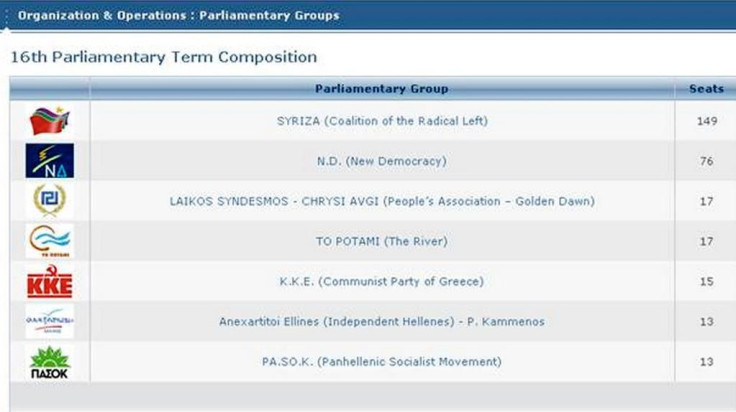Greek Debt Crisis: Following Bailout Agreement, Greece Faces Steep Political Hurdles At Home

Greek Prime Minister Alexis Tsipras had a trying weekend. He looked like a “beaten dog,” two observers of the bailout talks with Greece’s European creditors told Bloomberg. Though he emerged with a bailout deal in hand -- and fears of a Greek exit from the eurozone stanched -- Tsipras might find an equally bruising fight back home.
Greece’s ruling coalition, the left-wing Syriza party, has fractured in recent weeks over previously unheard-of concessions to European creditors. Tsipras will have until Wednesday to cajole his party into supporting reforms regarding early pensions, budget cuts, privatization programs and tax hikes -- some of which are tougher than the measures Greek citizens rejected by a wide majority in a snap referendum held July 5.
The political situation is substantially more convoluted than 19 finance ministers shuffling through proposals in a Brussels conference room. Roughly 30 members of Syriza have indicated they might reject the proposals, a potential death knell for a party built on opposing austerity. On Monday, Greek media reported the resignation of deputy minister of European Affairs Nikos Chountis.
He likely won't be the last to leave Greece's government as it considers the divisive deal. “There’s now some visible fracturing within Syriza with some at the top who do see it as a betrayal,” says Northeastern University political science professor Mai’a Davis Cross.
Fragile Coalition
The agreement requires Greece to pass legislation reforming pensions, particularly early pensions, and overhauling its value-added tax system by Wednesday. Before the crucial bailout funds flow to Greece, its government would also have to ensure complete independence of the national statistics office such that it produces true and accurate statistics, unaffected by politics.
In the following weeks and months, Greece will also need to revamp its labor policies, privatize government-owned industries, reform product markets and sell off 50 billion euros ($55 billion) in government assets, among other measures.
“We put up a hard fight for the past six months and we fought to the end in order to get the best out of it, to get a deal which will allow the country to stand on its feet and the Greek people to keep fighting,” Tsipras said Monday.
Some of that fighting will occur in his own party. As it stands Monday, Syriza is one member shy of a majority in the 300-member Greek parliament. The party’s dominance hangs on a strategic partnership with the right-wing Independent Greeks party.

But with radical-left factions of Syriza signaling their unwillingness to abide by further austerity demands, the precarious arrangement could be upended -- and the planned bailout endangered.
“The agreement will mean significant political shifts," says Georgios Karyotis, senior lecturer in international relations at the University of Glasgow. Karyotis predicts that several government ministers will resign and a new ruling coalition will emerge in parliament.
He expects to see the proposals make it through the parliament, however, which has been largely opposed to the alternative: a likely devastating Grexit from the euro currency. But even practically speaking, it will be a heavy lift.
“They are basically demanding Greece come up with four major new legislative efforts in two days,” says Karyotis. “Passing new, ambitious legislation within two days is a tall order.”
It also poses a challenge to the basic promise Syriza made to the Greek people. As the wave of populism that brought Syriza to power crashes against the German-led wall of resistance in the eurozone, Syriza’s anti-austerity mandate has fallen victim to the exigencies of membership in the European monetary union.
“Using the EU currency does mean you give up some of your sovereignty,” says Cross. “Greece needs to realize it’s not an exception.”
“Economic Terrorism”
Though the bailout deal has been cast as a complete capitulation on the part of Tsipras, Greece did win a few small victories. "Rather than just being all cuts, there are provisions in the deal to make the Greek economy more competitive," says Karyotis.
The government will be able to manage and oversee the planned sale of state assets, rather than turning the process over to an independent fund. The EU promised up to 35 billion euros ($38.6 billion) in stimulus funding for the Greek economy.
And negotiators axed a clause suggesting a potential “time-out” of Greece from the eurozone -- meaning a temporary Grexit.
But the bulk of the deal consists of policies that the combative former finance minister, Yanis Varoufakis, has infamously deemed economic “terrorism.”
Among the most detested demands are those related to pensions. Greeks have withstood a steady erosion of pension benefits since austerity programs began in 2010, though eurozone finance ministers still contend the system could still use some trimming. Average pension payments have fallen roughly 30 percent.
Syriza considers remaining pension benefits to be an indispensable welfare program. According to the government, as many as 45 percent of pensioners live at or near the poverty line. Around half of Greek households depend financially on retirement benefits.
In the immediate term, Greece would need to set its pension funds on a trajectory for full funding. The pension fund’s deficit currently amounts to 9 percent of GDP. Previous proposals have called for Greece to eventually raise its retirement age to 67 and cut out the hugely popular “solidarity grants” made available to poorer pensioners.
But when compared to the uncertainties of a Grexit, these previously unpalatable programs have become more feasible.
And ordinary Greeks have felt the urgency for weeks. Following the announcement of the referendum in late June, the European Central Bank froze the level of liquidity it was supplying to Greek banks, effectively locking them out of capital. After the government closed banks and imposed withdrawal limits, hours-long lines sprang up at ATMs across the country.
The measures were effective in ratcheting up the pressure on Greece, says Karyotis. The freeze, he says, “leaves little room for delays or uncertainties in the legislative process, still being conducted under conditions of economic asphyxiation.”
© Copyright IBTimes 2024. All rights reserved.





















